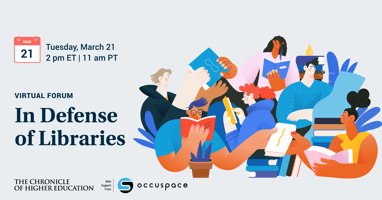4/05/21 - The chronicle of Higher Education partnered with Occuspace for the “Rethinking Campus...
What We Learned From The Chronicle of Higher Education’s “The Evolving Role of the Campus Librarian” Webinar
8/04/21 -
Occuspace partnered with The Chronicle to present “The Evolving Role of the Campus Librarian” webinar on August 2, to discuss the growing responsibilities of librarians and how they have changed due to the pandemic.

Hosted by Scott Carlson, Senior Writer at The Chronicle, with panelists:
- Elaine Westbrooks, Vice Provost of University Libraries & University Librarian at University of North Carolina Chapel Hill
- Clarence D Maybee, W. Wayne Booker Chair of Information Literacy at Purdue University
- Peggy Seiden, College Librarian at Swarthmore College
Here are our takeaways from the session:
From the get go, all three panelists emphasized how much the role of the librarian has changed in recent times, and how their responsibilities now extend far beyond collecting books and special collections. Budget cuts and reduced occupancy due to the pandemic completely shifted the priorities for libraries and librarians in a variety of ways. We took away from this webinar three major themes that were discussed as they relate to a librarian’s current role: Space, Digitization and Data Literacy.
The Library as a Physical Space
As schools begin to reopen for the fall, librarians are focused on getting students back through library doors. They aim to give students a safe, comfortable, and inclusive place in order to reestablish the library as a main hub on campus. The panelists pointed out what the physical library space means to the dynamic of the campus and how it became critical over the course of the pandemic.
Clarence Maybee from Purdue highlighted how for them, the pandemic brought different teams together, and to the library, to try to solve problems collectively. It actually broke down barriers, and improved how administrators engaged with students.
Peggy Seiden, from Swarthmore College, explained how they have been doing interior renovations in the library and are seeing what spaces based on how they are structured are most popular with students. They found success in creating a tech services stack and office space, which were immediately packed and very well liked with students.
Post-pandemic, the library is no longer just a physical building to house books, but a place where students and faculty go for knowledge, expertise, collaboration and an overall sense of community.
“There are a variety of huge impacts of the pandemic, and the first one really is space. Most libraries occupy beachfront property on any campus, so it's really accelerating the need to think of libraries as not necessarily those book repositories but these hubs that have partners and partnerships. So we are rethinking the space for books and staff.”- Elaine Westbrooks, Vice Provost of University Libraries & University Librarian at UNC Chapel Hill
A Digital Shift Making Data Literacy Key
The stay at home orders during the pandemic caused a digital shift that made electronic content and other online resources more important than ever before. Libraries embraced this and doubled down on e-content, working to make sure both students and faculty had access to it - something that all the panelists agreed was here to stay.
This digital shift caused librarians around the country to rethink what it meant to be a librarian, and what skills for library personnel were necessary going forward. One key skill that all the panelists talked about was data literacy.
Elaine Westbrooks of UNC Chapel Hill went as far as to say “Data is King”, and that having skills in data curation, data preservation, data science, data management, and so on is valuable for library staff. Westbrooks predicted that library organizations will shrink, and automation will continue, so having a skillset that plays to the digital aspect of the library will be critical. All the panelists agreed that data literacy is not something that stops with library employees, but is something that they want to play a big role in students' education. Maybee even said they are looking to incorporate data literacy into all undergraduate courses at Purdue University.
Throughout the pandemic, the panelists noted that staff struggled in some facet - whether it was adjusting to working remotely or on the flip side, struggling to return to work on campus. All the panelists agreed that going forward librarians need to realize the adjustments that staff are going through and lead with care, empathy, and with wellness in mind. Focusing on creating inclusive environments that bring people together, especially as the topics of diversity, equity, and inclusion are at the forefront of conversations. Overall, it is undeniable that the pandemic changed the role of the library on campus, and the responsibilities that librarians maintain and those they have added during these unprecedented times. No longer just bookkeepers, librarians are now space planners, supporters, partners and leaders.
These were our key takeaways from the August 2 webinar, but if you’d like to watch the full event yourself, here is the link to the recorded session.
Contact us to learn more about how Occuspace is helping universities across the US and Canada provide more convenient and comfortable on-campus spaces for students, faculty, and staff.
Stay Informed - Subscribe Today!



-1.png?height=200&name=future_of_libraries_cover%20(1)-1.png)
